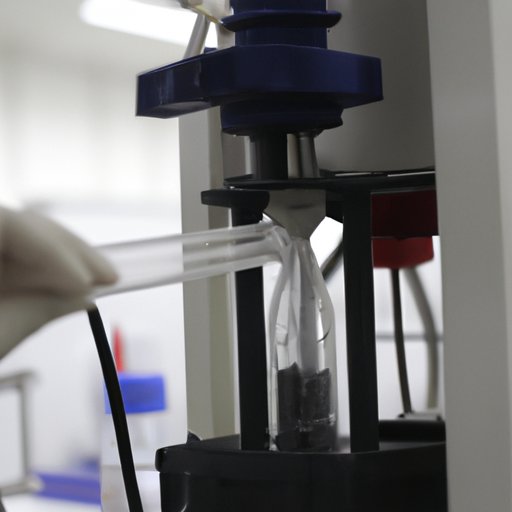Introduction
Chemistry is the scientific study of matter and its properties. It is considered the central science because of its connections to all other sciences, such as biology, physics, and astronomy. This article will explore how chemistry plays a role in understanding life and physical sciences, engineering and technology, medicine, agriculture, and environmental science. Additionally, it will examine the impact of chemistry on everyday life and its interdisciplinary nature. Finally, the development of new materials and products through chemistry will be discussed.

Chemistry in Understanding Life and Physical Sciences
Chemistry plays an important role in understanding the structure and behavior of matter. According to renowned chemist Peter Atkins, “Chemistry is the science that tells us what things are made of and why they behave as they do.” Chemical reactions, which involve the rearrangement of atoms, are essential to understanding life and physical sciences. For example, chemical reactions are responsible for photosynthesis, which is a process used by plants to convert sunlight into energy.
Chemistry is also integral to understanding the universe. Astronomers use the principles of chemistry to understand the composition of stars and planets. Physicists use chemical processes to develop new materials and technologies, such as superconductors and semiconductors. In biology, chemists study how chemical reactions occur in living organisms and how they can be manipulated to treat diseases.
Chemistry in Engineering and Technology
Chemical processes and materials are used in many engineering and technological advancements. Chemical engineers use their knowledge of chemistry to design new processes and products. For example, they work on designing fuel cells, which are energy-producing devices that use chemical reactions to generate electricity. They also develop new materials, such as polymers, which are used in a variety of applications, including electronics, medical devices, and construction.
Chemical engineers also develop processes for manufacturing chemicals and pharmaceuticals. They create methods for producing chemicals safely and efficiently, as well as processes for purifying and packaging them. Additionally, chemical engineers work on improving existing processes and developing methods for recycling waste materials.
Chemistry in Medicine, Agriculture, and Environmental Science
The principles of chemistry are applied in medical sciences to better understand the human body and develop treatments for diseases. Chemists study the structure and function of proteins, DNA, and other molecules to uncover the mechanisms behind disease. They also develop drugs and treatments based on their understanding of chemical processes.
In agriculture, chemistry is used to improve crop yields and develop pest control strategies. Agricultural chemists study soil composition and nutrient levels to optimize crop growth. They also develop fertilizers and pesticides to improve crop production.
Environmental scientists use chemistry to monitor air and water quality, as well as to assess the effects of pollution on ecosystems. They study the chemical processes involved in the degradation of pollutants and develop methods for cleaning up contaminated sites.

Impact of Chemistry on Everyday Life
Chemistry has a huge impact on everyday life. It is used in food production, preservation, and packaging. Food chemists work on improving food safety, flavor, and nutrition. They develop methods for preserving food and creating new food products.
Chemistry is also used in the production of cosmetics, cleaning products, and other household items. Cosmetics chemists formulate products, such as makeup and skin care products, while cleaning product chemists create detergents and disinfectants. Additionally, chemists develop new materials, such as plastics and fabrics, which are used in a variety of consumer products.
Interdisciplinary Nature of Chemistry
The interdisciplinary nature of chemistry is one of its biggest strengths. Chemistry is connected to many different scientific fields, such as biology, physics, and engineering. This interconnectedness allows chemists to apply their knowledge to a wide range of topics, from drug development to nanotechnology.
Interdisciplinary research is becoming increasingly common as researchers recognize the potential of combining different disciplines. For example, chemists and biologists are working together to study the molecular basis of disease. Similarly, chemists and engineers are collaborating to develop new materials and technologies.

Development of New Materials and Products
Chemistry plays a key role in the development of new materials and products. Chemists develop new materials, such as polymers, ceramics, and composites, which are used in a variety of applications. For example, polymers are used in electronics, medical devices, and construction materials, while ceramics are used in aerospace and automotive industries.
Chemists also develop new products, such as pharmaceuticals and biotechnology products. They use their knowledge of chemical processes to develop drugs and treatments for diseases. Additionally, chemists work on developing new fuels, such as biofuels, which can replace fossil fuels.
Conclusion
Chemistry is the central science because of its connections to all other sciences and its relevance to everyday life. It plays a crucial role in understanding the structure and behavior of matter, as well as in developing new materials and products. Additionally, its interdisciplinary nature makes it an invaluable tool for researchers. Chemistry is essential to understanding life and physical sciences, engineering and technology, medicine, agriculture, and environmental science, and it has a profound impact on society and everyday life.
(Note: Is this article not meeting your expectations? Do you have knowledge or insights to share? Unlock new opportunities and expand your reach by joining our authors team. Click Registration to join us and share your expertise with our readers.)
